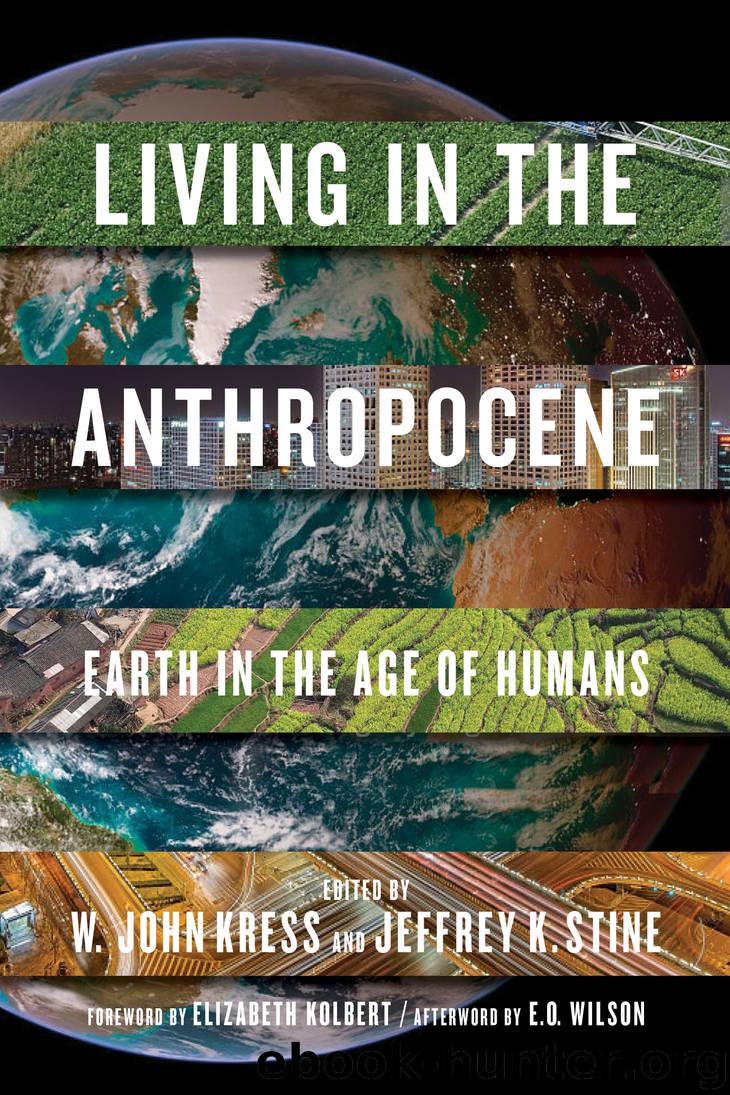Living in the Anthropocene by W. John Kress

Author:W. John Kress
Language: eng
Format: epub
Publisher: Smithsonian
Published: 2017-09-26T04:00:00+00:00
HUMAN HEALTH IN THE ANTHROPOCENE
GEORGE E. LUBER
As humans entered the Holocene epoch, marked by the end of the last major glacial advance, or ice age, some 11,700 years ago, a planetary transformation began to occur. Increasingly, people lived in permanent settlements, moved away from foraging and hunting for food, and made farming the major mode of subsistence. In the intervening millennia, much of the planet has changed as a result of the quickening pace of human activity and population growth. Today, almost a third of Earth’s arable land has been converted to cropland or pasture, more than 90 percent of monitored fisheries are harvested at or above sustainable yield limits, about half of annual available freshwater is appropriated for human use, and species extinction rates are more than a hundred times greater than has been observed in the fossil record.
Perhaps the most startling of all of these global transitions has been the profound alteration of Earth’s atmosphere; concentrations of major greenhouse gases—carbon dioxide, methane, and nitrous oxide—are at their highest level in more than eight hundred thousand years, in large part due to the burning of fossil fuels and large-scale land-use changes. The scope and scale of these planetary changes have prompted several in the scientific community to call for the designation of a new epoch, the Anthropocene.
While many of the planetary changes that the Anthropocene represents have consequences for human health, perhaps none will have as broad and transformative an impact as climate change. From weather extremes that directly cause injury or death to potentially profound changes in disease ecology and geography brought about by large-scale state shifts in Earth’s ecosystems, climate change will be among the defining issues for public health in the twenty-first century.
Climate change poses a threat to human health in a variety of ways: injury and death from heat waves, extreme storms, and reduced air quality from increasing ozone, aeroallergens, and drought-related wildfire smoke; illnesses transmitted by food, water, and vectors such as mosquitoes and ticks; and mental health impacts subsequent to disasters. More important, climate change will threaten the critical systems and infrastructure we rely on to keep us safe and healthy: communication and transportation during emergencies, food and water systems during drought, energy grids during prolonged heat waves. As the magnitude and frequency of extreme weather events increase, the resilience of these systems will be tested, and vulnerabilities will be exposed. It is in this sense that climate change will serve as a risk multiplier, amplifying both the exposures that bring about health risks and the vulnerabilities to these exposures.
While climate change will be an important driver of human health, it does not work independently. Other trends that define the Anthropocene—such as urbanization, pollution, and land-use change—will work together with climate change to intensify the threats to human health. Perhaps the most defining feature of the Anthropocene for humans will be the dominance of the urban setting as the primary habitat for large populations. Today, more than half of the planet’s population lives in cities; fifty years ago, that number was only 30 percent.
Download
This site does not store any files on its server. We only index and link to content provided by other sites. Please contact the content providers to delete copyright contents if any and email us, we'll remove relevant links or contents immediately.
The Lonely City by Olivia Laing(4797)
Animal Frequency by Melissa Alvarez(4459)
All Creatures Great and Small by James Herriot(4306)
Walking by Henry David Thoreau(3952)
Exit West by Mohsin Hamid(3822)
Origin Story: A Big History of Everything by David Christian(3680)
COSMOS by Carl Sagan(3617)
How to Read Water: Clues and Patterns from Puddles to the Sea (Natural Navigation) by Tristan Gooley(3458)
Hedgerow by John Wright(3352)
How to Read Nature by Tristan Gooley(3332)
The Inner Life of Animals by Peter Wohlleben(3304)
How to Do Nothing by Jenny Odell(3292)
Project Animal Farm: An Accidental Journey into the Secret World of Farming and the Truth About Our Food by Sonia Faruqi(3212)
Origin Story by David Christian(3194)
Water by Ian Miller(3177)
A Forest Journey by John Perlin(3067)
The Plant Messiah by Carlos Magdalena(2925)
A Wilder Time by William E. Glassley(2855)
Forests: A Very Short Introduction by Jaboury Ghazoul(2836)
